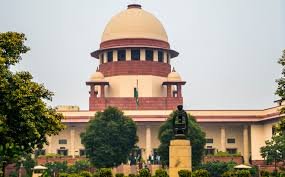The imposition of President’s Rule has brought rare but significant progress to Manipur: nearly 200 militants have been arrested, huge seizure of drugs made, and supply chains in conflict-hit zones restored. But these hard-won gains risk being undone unless reconciliation efforts continue and border security is strengthened. That’s why Manipur needs the continuation of President’s Rule, writes Navin Upadhyay.
May 13, 2025:
In the wake of the ethnic violence that erupted in Manipur on May 3, 2023, between the Meitei and Kuki-Zo communities, the imposition of President’s Rule in February 2025, following the resignation of Chief Minister N. Biren Singh, has marked a critical juncture for the state. While calls for reinstating an elected government grow louder, the tangible improvements in law and order under central administration—evidenced by significant militant arrests and drug seizures—argue strongly for the continuation of President’s Rule until justice, accountability, and communal reconciliation are firmly addressed. This second part of the series examines the measurable progress in security operations, the persistent challenges in curbing the drug trade, and the broader implications for Manipur’s fragile law and order situation.
Surge in Militant Arrests: Dismantling Insurgent Networks
Since the imposition of President’s Rule, security forces, including the Indian Army, Assam Rifles, Central Reserve Police Force (CRPF), and Manipur Police, have intensified counter-insurgency operations, yielding significant results. Between February and May 2025, nearly 200 militants and extortionists from various banned outfits have been arrested across the state, a sharp increase compared to the pre-2025 period.
From February 13 to May 13, 2025, Manipur Police operations, as reported by the @manipur_police X handle and related news sources, primarily targeted cadres of banned militant and extortionist groups in districts like Imphal East, Imphal West, Thoubal, Bishnupur, and Churachandpur. The crackdowns focused on curbing extortion activities, with frequent arrests reflecting the prominence of certain groups in Manipur’s insurgency networks.
The Kangleipak Communist Party (KCP), particularly its PWG, Noyon, and City Meitei factions, saw the most arrests, dominating extortion rackets targeting businesses and officials in the Imphal Valley. The United National Liberation Front (UNLF), mainly the Pambei faction, followed, with cadres arrested for extorting hospitals and toll booths. The Kuki National Army (KNA) was prominent in Churachandpur, linked to arms smuggling and extortion in Kuki areas. The People’s Revolutionary Party of Kangleipak (PREPAK), Pro faction, and the emerging SOREPA also faced significant arrests, focusing on extorting shopkeepers and youth recruitment.
These arrests reflect a strategic shift under President’s Rule, with enhanced coordination among security agencies and intelligence-driven operations. The seizure of sophisticated weapons, including HK rifles and IEDs, underscores the dismantling of insurgent networks that have exploited Manipur’s ethnic fault lines. The crackdown has also targeted extortion, a primary revenue source for militant groups, with arrests focusing on cadres extorting small businesses and professionals in both the Imphal Valley and hill districts.
Drug Seizures: A Mixed Success in Combating Narco-Trafficking
Manipur’s proximity to the Myanmar border has long made it a hub for drug trafficking, with poppy cultivation and methamphetamine (Yaba) smuggling fueling both militant activities and economic distress. Since President’s Rule, security forces have escalated efforts to curb this menace, achieving notable seizures but facing persistent challenges.
ALSO READ: Why Manipur Needs Continuation of President’s Rule (Part-1)
On 12.05.2025, security forces arrested 02 (two) active members of KCP (PWG) from a rented house located at Mantripukhri Mercylane, Imphal East District, namely,
i.Asheibam Gopen Singh (43) of Andro Makha Leikai, Imphal East District and
ii.Laishram Sanamacha Leima (45) of Sinam… pic.twitter.com/TiEV0aGBmR— Manipur Police (@manipur_police) May 12, 2025
Over the last three months, security forces seized at least 15.5 kg of heroin, 3.9 kg of brown sugar, 300,000 WY tablets, and other substances like codeine, with a combined estimated value exceeding ₹32 crore. These figures likely represent only a fraction of the total drug trade, given the porous Indo-Myanmar border and incomplete border fencing.
At least 19 individuals were arrested across these operations, including traffickers, lookouts, and poppy cultivators. The involvement of both local residents and cross-border networks (e.g., links to Dimapur and Myanmar) underscores the complexity of the trade.
The major drug busts in Manipur from February to May 2025 demonstrate a robust response to the state’s narco-trafficking problem, with significant seizures of heroin, brown sugar, and WY tablets. However, the persistence of the trade, fueled by cross-border smuggling and local cultivation, highlights the need for sustained, impartial enforcement and broader socio-economic interventions to address the root causes. Continuing President’s Rule facilitates these efforts by ensuring centralized oversight, but long-term success depends on addressing ethnic tensions and securing the Indo-Myanmar border.
Despite the successes, the drug trade remains a formidable challenge. Poppy cultivation, particularly in Kuki-Zo-dominated hill areas, persists due to economic necessity for some communities, though it is not exclusive to any single group. Militant outfits across ethnic lines exploit the trade to fund insurgencies, and allegations of complicity among political and bureaucratic elements complicate enforcement.
Improvement in Law and Order: A Fragile but Measurable Gain
The imposition of President’s Rule has brought a degree of stability to Manipur, though the situation remains volatile. Key indicators of improvement include:
• Reduced Violence: While ethnic clashes continue sporadically, the intensity of violence has decreased since the peak in 2023, which saw over 260 deaths and 60,000 displacements. Security forces’ deployment of 126 army columns and 62 paramilitary companies has curbed large-scale confrontations, with strict curfews and checkpoints limiting militant mobility.
• Enhanced Security Measures: President’s Rule has enabled direct central oversight, bypassing the state government’s earlier failures, as noted by former Chief Justice Siddharth Mridul. Operations have shifted to proactive searches, with 22 IEDs and other explosives recovered in one instance alone.
However, challenges persist. The ethnic divide between Meiteis and Kuki-Zo, exacerbated by the 2023 violence, continues to fuel mistrust. Allegations of bias in security operations, keep surfacing with claims of selective arms recovery and partisan conduct by some forces. The looting of 8,000 arms from police armories in 2023 has left both communities heavily armed, complicating disarmament efforts.
General Improvement:
Public services are being gradually restored. Several schools and hospitals that had shut down due to unrest have reopened, while blocked supply chains for food, fuel, and essentials are being reestablished in remote and conflict-hit zones.
Governance has taken a more neutral turn, with the Centre directly overseeing administrative decisions. This has led to fairer distribution of resources and more balanced handling of tribal grievances and the resettlement of displaced communities.
Communication infrastructure has also improved. Mobile networks and internet services have been restored in areas previously under blackout, and helplines have been launched to support affected citizens, along with better coordination with the media.
These developments signal cautious progress in Manipur’s road to recovery.
Why President’s Rule Must Continue
The progress in militant arrests and drug seizures under President’s Rule demonstrates the effectiveness of centralized, intelligence-driven security operations. However, the Supreme Court’s ongoing investigation into allegations against former Chief Minister N. Biren Singh—potentially implicating him in the 2023 violence—casts a long shadow over any premature return to an elected government. Restoring a government without resolving these allegations risks legitimizing impunity and further alienating the Kuki-Zo community, which has already demanded a separate administration.
Moreover, the fragile gains in law and order depend on sustained central oversight. The state government’s failure to comply with judicial directives during the crisis, as highlighted by Justice Mridul, underscores the need for an impartial administration until accountability is established. The ethnic complexity of Manipur, with Meiteis seeking Scheduled Tribe status and Kuki-Zo defending their tribal rights, requires a neutral arbiter to mediate peace talks and disarmament—a role the central government is better positioned to fulfill.
Prioritizing Justice and Stability
Manipur stands at a crossroads. The crackdown on militants, extortionists, and seizures of drugs worth hundreds of crores since February 2025 signal a robust response to insurgency and narco-trafficking. Yet, the unresolved ethnic tensions, persistent drug trade, and judicial scrutiny of past leadership demand caution. President’s Rule, while not a permanent solution, provides the necessary framework to pursue justice, rebuild trust, and consolidate security gains. Hastening to reinstate an elected government without addressing these fundamentals risks reigniting violence and undermining the sacrifices of those affected by the 2023 crisis. For Manipur to heal, accountability must precede political restoration.














